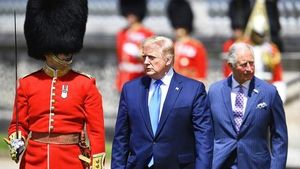DeepSeek, the Chinese AI startup making waves with its newly launched R1 model, has stirred significant concerns across the global tech industry and raised alarms over data privacy and security risks. The rapid emergence of this game-changing AI model has not only challenged established players like OpenAI and NVIDIA, but has also ignited fears about the impacts it may have on user data safety and the broader geopolitical AI race.
On January 29, 2025, Alibaba followed suit by introducing its competitive Qwen2.5-Max model, fueling tensions and prompting tech leaders to reevaluate their standing. These developments have sent ripples through financial markets, most prominently resulting in historic losses for companies like NVIDIA, which saw its stock plummet to unprecedented lows after DeepSeek's surprise launch.
According to industry analysts, DeepSeek's R1 model offers significant cost advantages over existing AI systems, prompting concerns about its ability to reshape the market dynamics for AI technology. Sahil Agarwal, CEO of Enkrypt AI, noted the troubling realities associated with DeepSeek’s innovations, stating, "DeepSeek-R1 offers significant cost advantages... but these come with serious risks." With its excellent performance metrics, DeepSeek has emerged as one of the strongest challengers to U.S.-based AI models.
DeepSeek’s recent success was marked by the R1 model quickly becoming the top downloaded app on Apple's U.S. App Store, overtaking even the likes of ChatGPT. This sudden increase in interest left Wall Street reeling, inciting manufacturers to rush their responses. The tech world was clearly caught off guard, as many did not foresee the arrival of such prodigious competition.
Market analysts report substantial financial losses, with NVIDIA experiencing the worst fall, dropping by 60% as investors ran from the stock fearing reduced demand for high-end AI chips. Major companies like Microsoft, Meta, and Google faced similar fate, losing billions almost overnight due to the unexpected shakeup.
This unprecedented financial market response has highlighted not just the competitive spirit within the stratosphere of AI innovation, but the pressing issue of data privacy. Recent reports revealed alarming details related to data handling practices at DeepSeek, emphasizing the gathering of users' keystroke data and IP addresses. Lauren Hendry Parsons, a digital privacy advocate at ExpressVPN, raised red flags about practices like this, warning, "The blending of this data aims at matching user actions... alarm bell for anyone concerned with their privacy."
Privacy advocates are concerned about the potential for misuse, especially as products proliferate with capabilities to track user actions across multiple platforms. With DeepSeek's rapid technological advancements, there’s growing agitation among privacy advocates about the future of individual data protections.
From the security perspective, James Sherlow, Systems Engineering Director of Cequence Security, contextualized the recent lax security measures, describing them as products of hurried and unregulated development. He shared, "Security must integrate seamlessly with existing workflows... support swift market innovations." This statement underlines the imperative need for tech companies to strike a delicate balance between innovation and security management.
Meanwhile, discussions surrounding geopolitics have intensified, as overlooked AI models may not only shape enterprise tech but could also have militaristic purpose. Dan Schiappa, Chief Product and Services Officer at Arctic Wolf, articulated fears connected to DeepSeek's breakthroughs and their potential effects on national security. He stated, "This could incite an 'AI arms race' echoing the historical space race." His reiteration reflects broad acknowledgment of the geopolitics at stake as AI continues unfettered development.
Even as the race between East and West rampages, Enkrypt AI’s research pointed out the perils of bias and security vulnerabilities tied to DeepSeek’s model. They claimed R1 exhibits “major security and safety gaps,” posing serious risks as malicious users could manipulate the model to produce harmful content including hate speech and misinformation. Agarwal commented on these vulnerabilities, asserting, “Our findings reveal major security and safety gaps.”
The discourse reflects the pressing necessity for regulatory frameworks to maintain data privacy protections and technological ethics amid rapid AI advancements. The narrative portrays users caught between the allure of technological innovation and the dire need to safeguard their personal data. The conclusion is clear: as the competition to innovate intensifies, the dialogue surrounding security protocols and user data protection must follow suit.
If these discussions continue to be sidelined, there’s potential for devastating consequences—both for users’ privacy and the market’s integrity. While AI's evolution fosters optimism for new solutions, the echoed warnings from experts signify the importance of vigilance and mindful governance.



